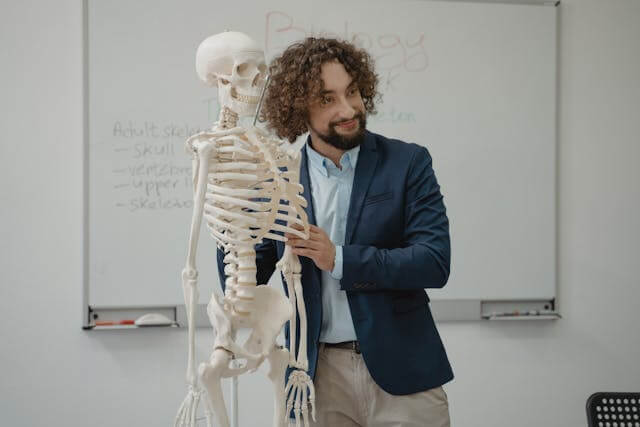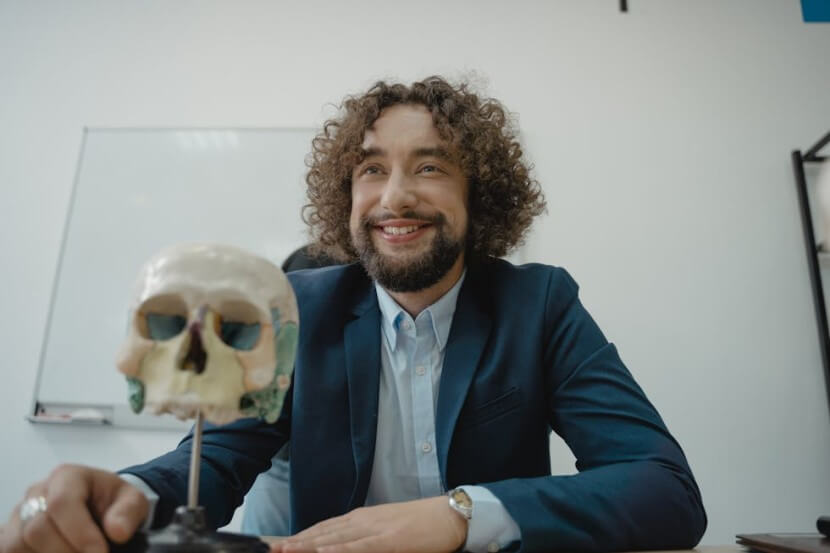Table of Contents
Learning German body parts vocabulary is an essential step for beginners. Whether you’re describing a symptom at the doctor, talking about your daily routine, or simply improving your vocabulary, knowing these key terms will make a big difference in your fluency.
Vocabulary List for Body Parts You Must Know
- der Arm (the arm)
- der Bauch (the stomach/belly)
- das Bein (the leg)
- der Finger (the finger)
- das Gesicht (the face)
- das Herz (the heart)
- der Hals (the neck)
- die Hand (the hand)
- die Haut (the skin)
- das Knie (the knee)
- der Knochen (the bone)
- der Kopf (the head)
- der Mund (the mouth)
- der Muskel (the muscle)
- die Nase (the nose)
- das Ohr (the ear)
- der Rücken (the back)
- die Schulter, die Schultern (the shoulder, the shoulders)
- der Zahn (the tooth)
- der Zeh (the toe)
- die Zunge (the tongue)
Learn German Body Parts: Example Sentences for Everyday Use

| Vocabulary | German Example Sentence | English Translation |
| der Arm | Ich habe mir den Arm verletzt. | I injured my arm. |
| der Bauch | Mein Bauch tut nach dem Essen weh. | My stomach hurts after eating. |
| das Bein | Sie hat lange Beine. | She has long legs. |
| der Finger | Er hat sich in den Finger geschnitten. | He cut his finger. |
| das Gesicht | Ihr Gesicht ist sehr freundlich. | Her face is very friendly. |
| das Herz | Sein Herz schlägt schnell. | His heart beats fast. |
| der Hals | Ich habe Halsschmerzen. | I have a sore throat. |
| die Hand | Kannst du mir bitte deine Hand geben? | Can you please give me your hand? |
| die Haut | Sie hat eine sehr weiche Haut. | She has very soft skin. |
| das Knie | Er hat sich das Knie verletzt. | He hurt his knee. |
| der Knochen | Der Knochen ist gebrochen. | The bone is broken |
| der Kopf | Mein Kopf tut weh. | My head hurts. |
| der Mund | Halt den Mund! | Keep your mouth shut! |
| der Muskel | Er trainiert seine Muskeln jeden Tag. | He trains his muscles every day. |
| die Nase | Seine Nase ist verstopft. | His nose is blocked. |
| das Ohr | Peter hört auf dem rechten Ohr nicht gut. | Peter can’t hear well in his right ear. |
| der Rücken | Mein Rücken tut nach dem langen Sitzen weh. | My back hurts after sitting for a long time. |
| die Schulter/die Schultern | Meine Schultern sind nach dem Training müde. | My shoulders are tired after the workout. |
| der Zahn | Mein Zahn braucht eine Füllung. | My tooth needs to be filled. |
| der Zeh | Ich habe mir den Zeh gestoßen. | I stubbed my toe. |
| die Zunge | Tina hat sich auf die Zunge gebissen. | Tina bit her tongue. |
Free German A2-B1 Short Story: A Visit to the Doctor
Read this German short story for A1-A2 beginners about a visit to the doctor. The story includes four multiple-choice questions (a, b, c) that test your understanding of the text.
Free Body Parts Quiz for German Beginners: Test Your Vocabulary Skills
Take this free vocabulary quiz to test your knowledge of German body parts.
Conclusion
Mastering German body parts vocabulary is essential for everyday conversations, medical visits, and daily interactions. By learning these key words, you’ll be able to describe symptoms, talk about your body, and improve your fluency.
Frequently Asked Questions (FAQ)
Why should I learn German body parts vocabulary?
Knowing body parts in German helps you in daily conversations, medical visits, and describing physical actions. It’s one of the most practical vocabulary topics for beginners.
What is the best way to remember German body parts?
- Use flashcards to memorize words.
- Practice with example sentences in real-life situations.
- Take interactive quizzes, like our body parts quiz.
How can I practice German body parts in context?
- Read stories that use body part vocabulary, like our A1-A2 short story.
- Describe symptoms as if speaking to a doctor.
- Label body parts on images in German.
Where can I find more German vocabulary lists?
You can explore many topics in our German vocabulary overview.
Are there quizzes to test my German vocabulary?
Yes! Check out our full list of vocabulary quizzes.

